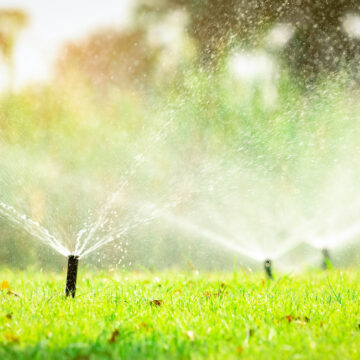If you’re looking for the best time to water grass, the answer isn’t quite as simple as just picking a certain time of day and sticking to it week after week. Figuring out the best time to water your grass, and how best to do it, depends on a variety of factors: where you live, the time of year, your lawn and soil type, your landscaping, and much more. We’ll explore all these factors and help you figure out the right watering schedule for your lawn.
When is the best time to water grass?
There are a lot of reasons why you should try to conserve water when watering your lawn. You’ll save money on your utility bills and help protect your community’s water supply. But in order to conserve water, it’s essential that you find the right time of day to water your lawn.
Typically, you’ll hear people say that the best times to water are in the early morning. This is because evaporation is the number one enemy when trying to keep your lawn lush and well-watered. Watering in the middle of the day or late afternoon, when temperatures are typically at their highest and the sun at its brightest, can cause the most water to evaporate from your lawn, leaving your grass thirsty and causing you to waste water.
Following this same logic, you should be able to water your grass in the evening or after the sun has set as well as early in the morning, right? Well, not quite. While watering later in the day does help you avoid the heat and sunshine that threatens your lawn midday, you actually do want some heat and evaporation to hit your lawn a few hours after watering, rather than letting it sit overnight. This is because your lawn can also suffer from too much watering, developing lawn diseases and rot.
That’s why watering in the early morning, between 5 and 9 a.m., roughly, helps your lawn absorb the moisture it needs over time, before the hottest part of the day hits around 3 p.m., without letting water sit on the grass too long.
How often should you water grass?
While the question of what time of day you should water your grass is a little easier to answer objectively, how often you should water your grass can depend on a number of factors, including your lawn type, your soil type, your climate, the time of year and more.
The most important thing (and good news) is that, for most climates, during most of the year, you should not have to water your lawn daily. In general, grass benefits from more thorough watering every few days rather than light (or heavy) daily watering. Here in St. Louis, we find most lawns benefit from good watering 2-3 times per week, but that they could need less or more watering depending on the rain and other weather conditions or the specific features of the yard.
How much water does grass need?
The question of how much water your lawn needs, again, relies on a similar set of variables as the last question. Other important factors to consider include:
• Is your lawn subject to shade, intense sun, or a combination of both?
• Is your lawn flat, sloped or a combination of both?
• Is your lawn well drained?
• Are you subject to windy conditions?
Your lawn might have different needs in different areas based on these factors, especially sun exposure, drainage and other plants or foliage.
On average, most lawns require about an inch or two of water per week. This is one reason why it’s important to plan around rainfall to ensure your lawn gets enough (and not too much) water. For most of the year, months when the lawn needs the most watering tend to correlate to the months with more rainfall. Sometimes, rainfall might be sufficient enough to give your lawn enough water, but in general, the summer months are where the rain starts to fall short of your lawn’s needs.
If your soil type or yard has a tendency to let a lot of water runoff or pool while watering, a good way to combat this and preserve water is to split your watering time in half and do two cycles. Cycle through the entire yard once, spending about half the time you need to sufficiently water your lawn. Once this first watering is complete, repeat the cycle. This gives your yard some time to soak up a little bit of water during the first cycle, allowing it to absorb more on the second pass, ensuring your yard gets adequate moisture without wasting water.
Why are sprinklers best for irrigating grass?
Automatic sprinkler systems are a great option for ensuring that your yard gets the right amount of water at the right times and eliminates the guesswork or close weather monitoring that do-it-yourself lawn maintenance can involve. By working with a professional team that understands irrigation principles and techniques, as well as your local environmental conditions, you can ensure you’re getting a system that will give your lawn the precise care it requires to look and feel its best. For more information on residential irrigation systems, contact Green Turf today.

